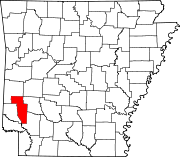Nashville, Arkansas
[6] Nashville is situated at the base of the Ouachita foothills and was once a major center of the peach trade in southwest Arkansas.
[7] Michael Womack (1794–1861), a Tennessee native reputed to have killed the British general Edward Pakenham during the War of 1812, settled in the area with his family in 1849.
Settlement in the area progressed slowly but steadily, though industry declined during the Civil War.
Following the war, the village's prospects improved, industry and settlement picked up, and the town was officially incorporated as Nashville on October 18, 1883, with D.A.
[11] With the establishment of county government in the town, and due to the increased trade and access brought by the railroad, Nashville continued to grow.
According to author Dallas T. Herndon, Nashville was "a banking town, with electric lights, waterworks, an ice and cold storage plant, a canning factory, foundries, machine shops, a flour mill, two newspapers, a brick factory, fruit box and crate factory, mercantile concerns... well-kept streets, [and] modern public schools.
The climate in this area is characterized by hot, humid summers and generally mild to cool winters.
"Up to 175 boxcars, each carrying 396 bushel baskets, were shipped from Nashville each day during peak production years.
For Howard County growers, the only option was to pull up the trees and convert the land for other purposes, often pasture for cattle, or to raise chickens," which remain the dominant agricultural products in the Nashville area to this day.
[20] Among them: The largest find of dinosaur trackways in the world was discovered by SMU archaeology graduate student Brad Pittman in a quarry north of the town in 1983, the site of a prehistoric beach.
The college has programs in business administration, nursing, truck driving, welding, residential construction, cosmetology, and general education coursework.
The college also provides non-credit coursework in adult education such as GED classes, ESL training, test preparation, and computer literacy.
In addition to academic coursework, Nashville High School has active chapters in FCCLA, FFA, and the National Honor Society.
The Nashville Scrappers compete in interscholastic sports under the sanction of the Arkansas Activities Association in sports such as football, basketball, baseball, cheerleading, cross country running, golf, softball, track and field, tennis, and trap shooting.
The center is a permanent collection of art from local artists and hosts ongoing exhibits of local work and items of regional interest, such as the original 1950s electronic marquee from the Art Deco, 1,500-seat Elberta Theater (1943–1996).
In 1881 the railroad was renamed the Arkansas and Louisiana Railway Co., and on October 1, 1884, a nearly 26-mile (42 km) extension to Nashville was opened.
[28] The earliest trains coming in and out of Nashville operated under the Missouri Pacific Railroad mark.
[32] He started his successful franchise in 1938 when, with $8,000 borrowed from his father, he opened a small store in his wife's hometown of Nashville.
Aside from a short period during World War II, the Dillard Company continued operating and expanding its Nashville location.

